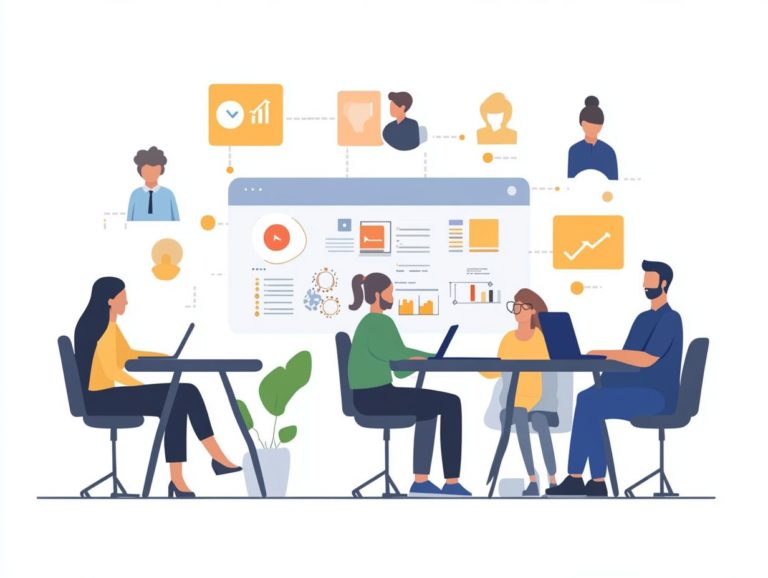How to Use CRM for Event Management
In today s fast-paced event management landscape, harnessing technology is crucial for your success.
Customer Relationship Management (CRM) systems have become invaluable tools that streamline both planning and execution, giving event professionals a significant edge.
This article explores the benefits of using CRM for event management, including enhanced efficiency and improved communication. You ll discover key features to look for, get guidance on selecting the right CRM platform, and learn best practices to unlock its full potential.
Continue reading to find out how CRM can elevate your event planning experience.
Contents
- Key Takeaways:
- What is CRM and Why is it Useful for Event Management?
- Benefits of Using CRM for Event Management
- Key Features of CRM for Event Management
- How to Implement CRM for Event Management
- Maximizing the Potential of CRM for Event Management
- Frequently Asked Questions
- What is CRM and how can it be used for event management?
- What are the key features of CRM that make it useful for event management?
- How can CRM help with event planning and logistics?
- Can CRM be used for attendee management and engagement?
- How can CRM improve the overall success of an event?
- Are there any downsides to using CRM for event management?
Key Takeaways:
- Streamline event planning and execution with CRM’s efficiency.
- Utilize CRM features like customer data analysis, task management, and communication for successful events.
- Choose the right CRM platform and integrate it with existing processes to maximize your event management success.

What is CRM and Why is it Useful for Event Management?
Customer Relationship Management (CRM) is an essential strategy for event management, where connecting with clients and attendees significantly impacts the success of your live events.
By leveraging CRM systems, you can streamline processes, improve attendee experiences, and effectively manage customer relationships ensuring every detail aligns with your event marketing goals.
These systems integrate automation tools and data management techniques that optimize client management, paving the way for successful events. Through CRM, you gain insights into client preferences and behaviors, helping you create experiences that exceed expectations.
Platforms like Zoho and HubSpot allow you to track attendee interactions, helping you reach out to attendees personally and boost satisfaction levels.
Analyze data from past events to make informed decisions that enhance attendance and engagement. This data-driven approach simplifies your planning process and strengthens relationships, making clients feel valued and understood.
With these powerful tools, you can make every gathering resonate with attendees, fostering loyalty and encouraging repeat business.
Benefits of Using CRM for Event Management
Integrating CRM systems into your event management process offers numerous benefits that elevate planning and execution, positioning you as a leader in your field.
By using CRM for client management, you can collect valuable feedback and utilize detailed insights to refine your strategies. This approach allows you to craft personalized attendee experiences that not only foster loyalty but also enhance engagement.
Embracing this vital tool can genuinely transform your events into exceptional experiences.
Efficiency and Effectiveness in Planning and Execution
Efficiency and effectiveness are cornerstones of successful event planning, and utilizing CRM systems enhances these elements through task automation and easy-to-use solutions.
Streamline your workflows to save valuable time and reduce errors, allowing you to focus on crafting unforgettable attendee experiences and developing compelling event marketing strategies.
With features like automated scheduling, resource allocation, and real-time communication tools, CRM solutions simplify the intricate logistics of event organization.
This integration brings your team together, making sure everyone is on the same page.
Cloud-based platforms allow you to access vital information from anywhere, enabling quick decision-making and efficient problem-solving. Task automation reduces repetitive tasks and encourages proactive engagement, significantly boosting overall productivity.
By leveraging these tools, you create a more coordinated and impactful event that achieves your organizational goals while exceeding attendee expectations.
Start using CRM today to transform your events!
Key Features of CRM for Event Management
Key features of CRM software for event management include robust customer data management, intuitive communication tools, and comprehensive project management functionalities, all carefully designed to boost the efficiency of event planners and coordinators.
By leveraging these features, you can enhance relationships with clients and streamline collaboration among diverse teams, ultimately leading to more successful live events!
Customer Data Management and Analysis

Effective customer data management and analysis are crucial components of CRM systems, enabling you as an event planner to gather and interpret invaluable insights that elevate your event marketing and planning processes.
By leveraging CRM for data management, you can spot trends, understand attendee preferences, and make informed decisions that lead to successful event outcomes.
This approach streamlines your planning phase and enhances your post-event evaluations significantly. Studies indicate that data-driven decision-making can result in a 5-6% increase in event ROI (Return on Investment).
By utilizing platforms like Pipedrive, which boasts robust reporting features, and HoneyBook, recognized for its client management capabilities, you can effectively analyze attendee data.
These tools enable you to enhance segmentation and targeted outreach, ensuring that your marketing strategies closely align with participant interests and behaviors. Ultimately, this creates more engaging and personalized experiences!
Task and Project Management
Task and project management within CRM systems enables you as an event planner to streamline your workflows and enhance collaboration across teams essential for executing successful events.
With task automation features and cloud-based platforms at your fingertips, you can efficiently delegate responsibilities, track progress, and maintain clear communication throughout the project lifecycle.
These features help you organize tasks and create a cohesive environment where your teams can brainstorm and share updates. The collaboration tools within these CRM systems are vital for smooth communication, allowing team members to stay connected no matter where they are.
Platforms like Monday and ClickUp shine in integrating these functionalities by offering shared dashboards and real-time messaging capabilities. This leads to a more unified approach to delivering exceptional events.
By leveraging such tools, you can ensure that everyone is aligned with project goals and timelines, significantly boosting your overall efficiency!
Communication and Collaboration
Effective communication and collaboration stand as the cornerstones of successful event management, and CRM software is essential in enhancing these elements.
By establishing seamless communication channels among event planners, coordinators, and clients, CRM enriches the overall attendee experience, ensuring that everyone is united in pursuit of a common objective.
Features like shared calendars enable you and your team to keep track of crucial dates and deadlines, while integrated messaging tools facilitate swift and effective conversations.
Real-time updates deliver instant information about any changes or developments, significantly reducing confusion and keeping everyone in the loop. This level of connectivity enhances teamwork and streamlines decision-making processes, resulting in more efficient event execution.
In turn, your attendees enjoy a well-organized and responsive event environment, creating a memorable experience that truly meets their expectations!
How to Implement CRM for Event Management
Implementing a CRM system for event management is a strategic decision that demands meticulous planning and consideration, especially when considering how to use CRM for lead generation.
Begin by selecting the right CRM platform that aligns perfectly with your unique needs as an event planner or coordinator.
By evaluating the functionalities of various CRM software options, like GlueUp and EventHub, you can ensure that you choose a solution that seamlessly integrates into your existing processes and elevates your overall efficiency.
Start exploring CRM systems today to take your event management to the next level!
Choosing the Right CRM Platform
Choosing the right CRM platform is essential for your event management success. It can significantly enhance your planning efficiency and elevate the attendee experience.
To achieve the best outcomes, analyze the specific functionalities these systems offer. For instance, customization features enable you to tailor the platform to your unique workflow, making processes intuitive and streamlined.
Cloud-based solutions give you access to critical data from anywhere, fostering seamless collaboration among your team members, no matter where they are.
Platforms like HubSpot exemplify these qualities with their user-friendly interface and extensive integration options. Daylite shines with its robust task and project management capabilities, perfect for smaller teams.
By prioritizing these key elements, you can ensure a seamless and successful event experience.
Integrating CRM with Existing Event Management Processes

Integrating CRM with your existing event management processes is crucial. This step significantly boosts efficiency and creates a seamless workflow among your event planners and coordinators, especially when using CRM to enhance customer experience.
Analyze your current processes to maximize CRM benefits. Understanding how CRM can automate tasks and enhance data management allows you to leverage your CRM system for maximum impact.
For example, when your event teams synchronize their CRM with registration systems, they can automatically update attendee information. This significantly reduces manual data entry and the potential for errors. This alignment allows quicker access to essential insights, such as tracking attendee preferences and behaviors, guiding you toward crafting more personalized event experiences.
Successful integrations, like those involving platforms such as Salesforce and Eventbrite, demonstrate the power of streamlined communication, improved lead tracking, and enhanced post-event analysis. Automating repetitive tasks, like follow-up emails or surveys, liberates time for your teams to focus on the creative aspects of event planning, ultimately driving better participant engagement and satisfaction.
Maximizing the Potential of CRM for Event Management
Maximizing the potential of CRM for event management requires you to implement best practices and strategies that fully leverage its features. For instance, exploring the top 5 CRMs for event management can elevate both the planning and execution of your events.
By prioritizing continuous improvement and adapting to emerging trends in event marketing and client management, you open the door to amazing success!
Best Practices and Tips for Success
Implementing best practices and strategies in event management with a CRM for event management can truly elevate how you handle processes and client relationships. By focusing on effective communication, data management, and harnessing automation tools, you can orchestrate memorable events that exceed attendee expectations.
- Centralize all client interactions to seamlessly track preferences and feedback over time.
- Swiftly access past comments and suggestions to enhance attendee satisfaction.
- Automate repetitive tasks like sending invitations or reminders to free up valuable time for strategic planning.
Consider a nonprofit organization that embraced these practices; they experienced a remarkable 40% increase in donor engagement at their annual fundraiser, all thanks to timely follow-ups and personalized communications made possible through their CRM insights.
Frequently Asked Questions
What is CRM and how can it be used for event management?
CRM stands for Customer Relationship Management. It is a software tool used to manage interactions and relationships with customers. CRM can streamline the organization and coordination of events, making it easier to plan and execute successful events.
What are the key features of CRM that make it useful for event management?
Have you ever wondered how to use CRM for event management and how it can transform your event management experience? Some key features of CRM that make it useful for event management include contact management, email marketing, task management, and event registration and tracking. These features allow for efficient communication and organization of event details and attendees!

How can CRM help with event planning and logistics?
CRM can help with event planning and logistics by providing a single place to store and access all event-related information. Additionally, it can assist with managing contracts, invoices, and vendor relationships, as well as how to use CRM for inventory management.
Additionally, CRM helps track event expenses and budgeting effectively.
Can CRM be used for attendee management and engagement?
Yes! CRM can be used for attendee management and engagement by tracking attendee information and interactions. It also allows you to send personalized communication and collect feedback through surveys.
This can significantly improve the overall attendee experience and enhance future events!
How can CRM improve the overall success of an event?
CRM can improve the overall success of an event by streamlining event planning and execution. It increases attendee engagement and satisfaction while providing valuable data and insights for future events.
Moreover, it saves time and reduces errors by automating tasks and processes.
Are there any downsides to using CRM for event management?
While CRM can be a valuable tool for event management, it might require some time to learn for new users. It may also come with a cost, depending on the CRM platform or software being used.
It s essential to prioritize data privacy and security when using CRM for event management.
Considering these factors, why not explore how CRM can elevate your next event?






